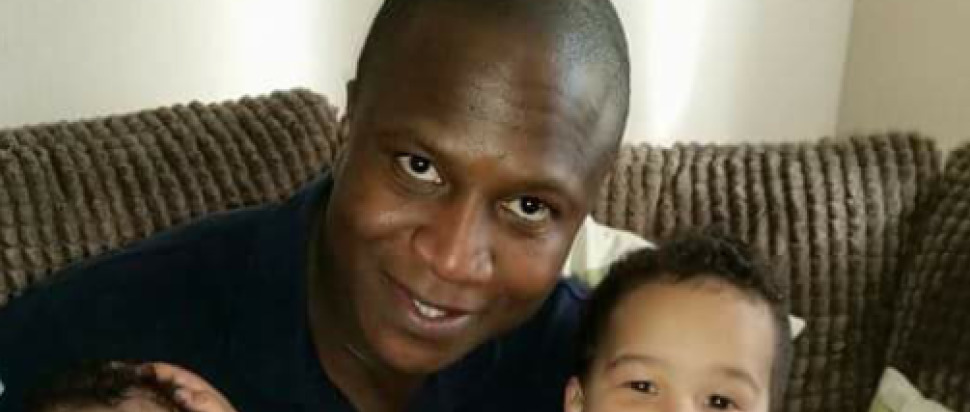Collective Duty: On community support & the Sheku Bayoh Inquiry
As the public inquiry into Sheku Bayoh’s death resumes, we reflect on solidarity, coming together, and holding those in power accountable
On Sunday 3 May 2015, Sheku Bayoh was declared dead. Barely a couple of hours before, on a street in Kirkcaldy, there had been an incident between Sheku and Police Scotland officers.
It is likely that over the past seven years and nine months you have seen Sheku’s face. In the photograph that’s most often used, there are some festive lights glinting in the background as Sheku, wearing a black t-shirt, takes up most of the frame, sitting arms crossed at a restaurant table. The flash of the camera sparkles in his eyes as he looks directly into the lens, the teeth of a shy smile just visible.
It seems incomprehensible that this smiling man could be the same person described as six-foot-tall with a nine-inch blade that officers were called out to; Sheku was actually five-feet-ten-inches, weighing just over twelve stone, and the blade was five to six inches. When police arrived at 7:20am in response to calls from members of the public, he was no longer holding it. Then, within minutes, Sheku was on the ground, at one point restrained by six police officers. After being restrained for four minutes and 23 seconds, Sheku stopped breathing. At 7.33am an ambulance arrived and took him to hospital. At 9.04am Sheku was declared dead, and it took around six hours for anyone to tell his family. His sister Kadi Johnson found out at 3pm that afternoon.
This was one of the first moments of interaction between Sheku’s family and the police that led them to begin what is likely to be a decade-long fight for justice. No officer has ever been disciplined because of Sheku Bayoh's death. No criminal charge has ever been brought.
In 2018, a BBC Disclosure documentary was broadcast which used evidence from the case to bring revelations to light. In November 2019, Humza Yousaf MSP, then Scottish Justice Secretary, announced a public inquiry would be held into the death of Shaku Bayoh. Part of the inquiry’s remit is to determine whether race was a factor in Sheku’s death.
In the summer of 2020, George Floyd was murdered by a police officer and in Glasgow and Edinburgh, thousands took to the streets, collecting in parks chanting ‘Black Lives Matter!’, Sheku Bayoh’s name and image on placards. It was a tragic moment of hope: yes, Sheku and his story were present on the lips of communities across the country but it had taken over five years.
Finally, in May 2022, seven years after Sheku’s death, the hearings for the public inquiry began. But what’s been pointed out by Kadi, and many others close to the family and the inquiry, is the lack of support.
Courtney Stoddart is a poet and performer, who has been consistently vocal in bringing attention to Sheku’s death. She also performed in Lament for Sheku Bayoh, an artistic response to Sheku’s death, written and directed by Hannah Lavery, and first performed as a rehearsed reading in 2019. “It’s disturbing when you think about the massive turnout for George Floyd’s death across Scotland, yet we can barely muster a hundred people to show up for Sheku,'' she tells me. Why do we so easily offer support and condolences to traumatic events happening thousands of miles away but seem unable to extend this same compassion to a similar case in our home communities?
The Scottish TUC has been very active and supportive of Sheku’s family, along with other grassroots and local community organisations but, overall, there hasn’t been a strong public presence at the inquiry. “I think it’s reflective of where society and culture are currently,” Stoddart says. “We are inundated with distractions and unless something directly affects us, we often look the other way simply because we can.”
It has also been difficult to rectify the damage of early media coverage and reporting of Sheku’s death. “Much of the coverage around Sheku was limited at best, defamatory, untruthful, and racist at worst,” says Stoddart. “It’s been hard to pull that back in a way that demystifies the deeper-rooted issues surrounding Sheku’s death.”
In times of crisis it is vital that we foster and find collective hope and solidarity in community. And it is possible: the summer of 2020 proved people were willing, but then they ran out of steam. “It’s our duty to hold those in powerful positions to account for wrongdoing,” says Stoddart. It’s a duty we all must take on.
“Sheku’s death highlights so many broader issues, not only racism but insidious corruption at the very heart of Police Scotland. These are issues which affect us all,” Courtney says. “What kind of country do we want to live in? What do we want to create and cultivate in our world for the generations yet to come? Surely it’s not a culture that stands idly by while people lose their lives at the hands of the state?”
Such questions are key as we look towards building further solidarity in the weeks to come. The inquiry resumed on Tuesday 28 February.
Details about how to attend the inquiry can be found at shekubayohinquiry.scot/ or follow @BayohJustice on Twitter for updates. For more information on the case, listen to Sheku Bayoh: The Inquiry, a new podcast from The Ferret
